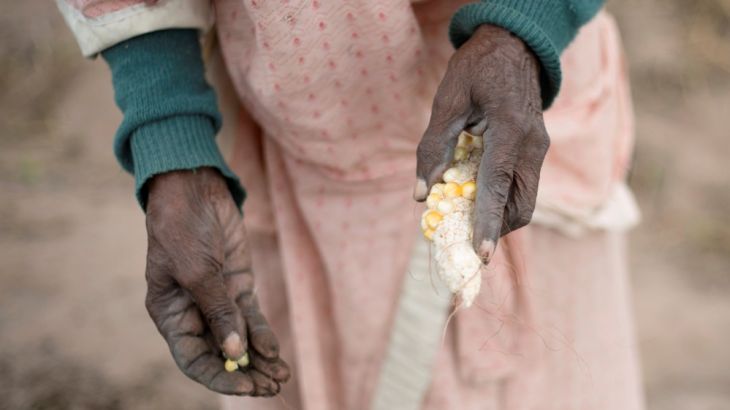‘We’re facing a double pandemic’: UN body warns of ‘mega-famines’
WFP warns of multiple famines if enough funds are not pledged to help poor nations fight ripple effects of coronavirus.

The United Nations’ World Food Programme (WFP) has warned that the world faces “mega-famines” if enough funds are not pledged to combat the ripple effects of coronavirus pandemic on the world’s most fragile countries, which are already grappling with food insecurity.
“What we are facing now is a double pandemic … [of] famines that could impact us at biblical proportions,” WFP’s executive director David Beasley said during a conference in Geneva on Thursday.
Keep reading
list of 3 itemsNew coronavirus outbreak: Facts and myths
Coronavirus: Which countries have confirmed cases?
Beasley said the UN’s food agency helps nearly 100 million people on any given day and “unless we can keep those essential operations going, the health pandemic will soon be followed by a hunger pandemic”.
“There’s no question. Mega-famines are on our brink literally right now,” he said.
“Before COVID-19 hit the scene, we already had 135 million people, as I say, marching on the brink of starvation. That’s in addition to the 821 million people that are chronically hungry.”
“On any given day, WFP offers a lifeline to nearly 100 million people. Unless we can keep those essential operations going, the health pandemic will soon be followed by a hunger pandemic." @WFPChief
More on the updated global plan to fight coronavirus in fragile countries 👇🏼
— World Food Programme (@WFP) May 7, 2020
UN issues new appeal for funds
Meanwhile, the UN on Thursday issued a new appeal for $4.7bn in funding to “protect millions of lives and stem the spread of coronavirus in fragile countries”.
The money is on top of the $2bn that the UN already called for when it launched its global humanitarian response plan on March 25. It has received about half of that money so far.
The updated appeal included nine additional vulnerable countries: Benin, Djibouti, Liberia, Mozambique, Pakistan, the Philippines, Sierra Leone, Togo and Zimbabwe.
COVID-19 infections are expected to peak in the world’s poorest countries in the next three to six months, according to UN estimates.
|
|
Dr Tedros Adhanom Ghebreyesus, director-general of the World Health Organization, said the caseload in most of the developing countries targeted for assistance in the UN appeal “may seem small, but we know that the surveillance, laboratory testing and health systems’ capacity in these countries are weak”.
“It is therefore likely that there is undetected community transmission happening,” he said.
UN agencies are attempting to create a coordinated, global response to the COVID-19 pandemic.
“The most devastating and destabilising effects” of the novel coronavirus pandemic “will be felt in the world’s poorest countries,” the UN’s head of humanitarian affairs, Mark Lowcock, said in a statement.
“Unless we take action now, we should be prepared for a significant rise in conflict, hunger and poverty. The spectre of multiple famines looms,” he warned.
UN refugee chief Filippo Grandi also said the impact of the pandemic on people who fled wars and persecution “has been devastating”.
He said the needs of refugees, people displaced in their own countries, stateless people and their hosts “are vast but not insurmountable”.
“Only collective action to curb the threat of the coronavirus can save lives,” he said.
Lowcock, the humanitarian chief, said the pandemic “is unlike anything we have dealt with in our lifetime”.
“Extraordinary measures are needed,” he said. “As we come together to combat this virus, I urge donors to act in both solidarity and in self-interest and make their response proportionate to the scale of the problem we face.”